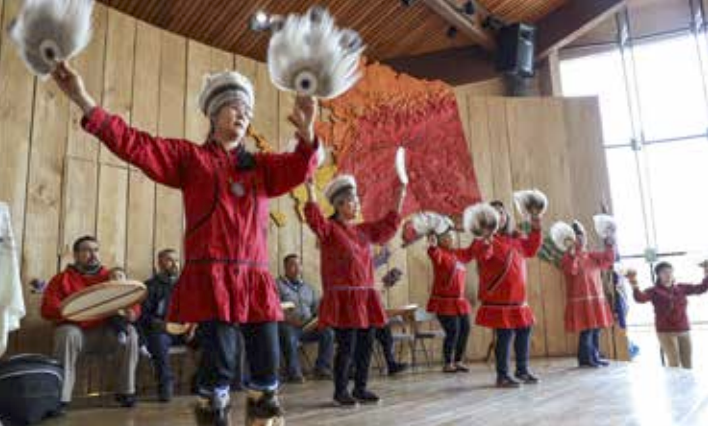MMIWG2S Alaska Working Group
A Collaborative Approach to Addressing the Crisis of Missing and Murdered Indigenous Women, Girls, and Two-Spirit Relatives (MMIWG2S)

Our Alaskan Native families continue to face injustice and experience high rates of violence. A study funded by the National Institute of Justice cited that 80% of American Indian / Alaska Native (AI/AN) women will experience violence in their lifetime. The Urban Indian Health Institute led research on MMIWG2S, citing that murder is the third leading cause of death among AI/AN Women. Alaska is not alone in this injustice. Indigenous people across the Nation and the world face the same story–losing our loved ones and experiencing violence at alarming rates. We must have a collective effort to address the safety of Indigenous people. It is the responsibility of our state government, Tribes, organizations, and individuals to work together to end MMIWG2S and to ensure the safety and well-being of Native people.
Creating the MMIWG2S Alaska Working Group
Indigenous organizations in Alaska have taken steps to create change and bring awareness and education on MMIWG2S; one way is through the creation of the MMIWG2S Alaska Working Group, where members coordinate, share communications, strategize, take action, and build community to address this crisis. The working group is an Indigenous Peoples-led statewide group supported by partner organizations: Alaska Native Women’s Resource Center (AKNWRC), Alaska Native Justice Center, Alaska Native Heritage Center, Data for Indigenous Justice, and Native Movement. Across these organizations, we support this group through a policy subcommittee, community organizers, cultural education, research and data, and communications. As Indigenous peoples leading the change we want to see, we are rooted in our shared values and commitment to the safety and well-being of our people.
Advocacy, Education, and Outreach
To effectively address MMIWG2S and missing and murdered Indigenous people (MMIP), we must address the interconnected issues related to public safety reforms and find ways to reduce violence. The Working Group provides education and outreach, gathering and sharing information on MMIWG2S/MMIP to ensure policymakers understand different strategies to address this issue affecting many Alaskan families. Some actions taken include presentations to local assemblies, Alaska State Legislature, hosting policy forums, and writing letters to local, state, and federal policymakers sharing information and policy recommendations.
Our policy and budget recommendations have been developed through conversations with communities and individuals who have identified gaps and issues within the current systems, discussions with public safety officials, and sharing ideas within our working group. Direct action items are important to identify and share with our policymakers so they understand the specific changes needed. We are responsible for sharing the knowledge we have gained through lived experiences, whether our own or those shared with us, to effect change. Some of the recommendations we have shared include specific MMIP Investigators, a designated MMIP Statewide Attorney, non-competitive grant funding for Tribes, an increase in the collection and processing of DNA, an increase in funding to support upgrades to the severely outdated 911 system, and increasing support and funding for public safety, especially in rural Alaska where many of our villages lack any or minimal public safety.
Successful Changes for MMIWG2S/MMIP
- Our collective advocacy and the efforts of Alaskans have resulted in these successes:
- Two new MMIP investigators at the Department of Public Safety.
- The creation of the MMIP Statewide Council.
- MMIP Awareness Day proclamations at state and local levels.
- Increased funding for the village public safety officers in rural Alaska.
The Working Group also holds several events, including partnering with the Anchorage Opera to bring the “Missing” opera to Anchorage, our annual 5k awareness run/walk, self-defense classes, policy forums, vigils, rallies, and other education, outreach, and healing events.
Our organizations within the working group have been instrumental in providing community resources such as the AKNWRC toolkit “Why We Wear Red”, which guides communities to develop an action plan that includes awareness, prevention, and intervention strategies. Data for Indigenous Justice released “We Are Calling to You” in 2021, the first Alaska baseline research and data report specifically for Alaska. The Alaska Native Heritage Center has been deeply involved with unboxing the history of boarding schools in Alaska and the interconnectedness of trauma within our communities related to violence and MMIWG2S.
As a working group, we elevate all these efforts to educate and amplify this work, creating a central space to share this work with our communities and continue collaborating on action items we host as a collective. More work remains, but this is HeartWork: we support and lift each other up.
Growing Presence
Since the start of the working group in 2018, we have seen not only changes in our state and federal policies but also the expansion of our work group as we welcomed our first two full-time staff members, an upcoming launch of a new website that will include a more expansive list of resources for individuals and communities. We have experienced increased requests for presentations, training, and participation in meetings related to MMIP and public safety. A number of our working group members have joined federal and state MMIP councils and commissions, including the Not Invisible Act Commission created by then-Representative Deb Haaland and the Alaska Statewide MMIP Council.
HeartWork
This work is deeply personal to us, our communities, and many people across Alaska who experience acts of violence and lose our loved ones at alarming rates. It is important our work centers around supporting each other, our communities, and our people. Each year we host a heartbeat of the drums and vigil to remember and uplift our loved ones who are missing and murdered and create a space for people to heal together. We do this work to bring justice to families, interrupt this systemic violence, and end this MMIP crisis. We are all concerned for the well-being of our children and future generations. It is our responsibility to do all we can to create a safer Alaska where Indigenous people thrive.





